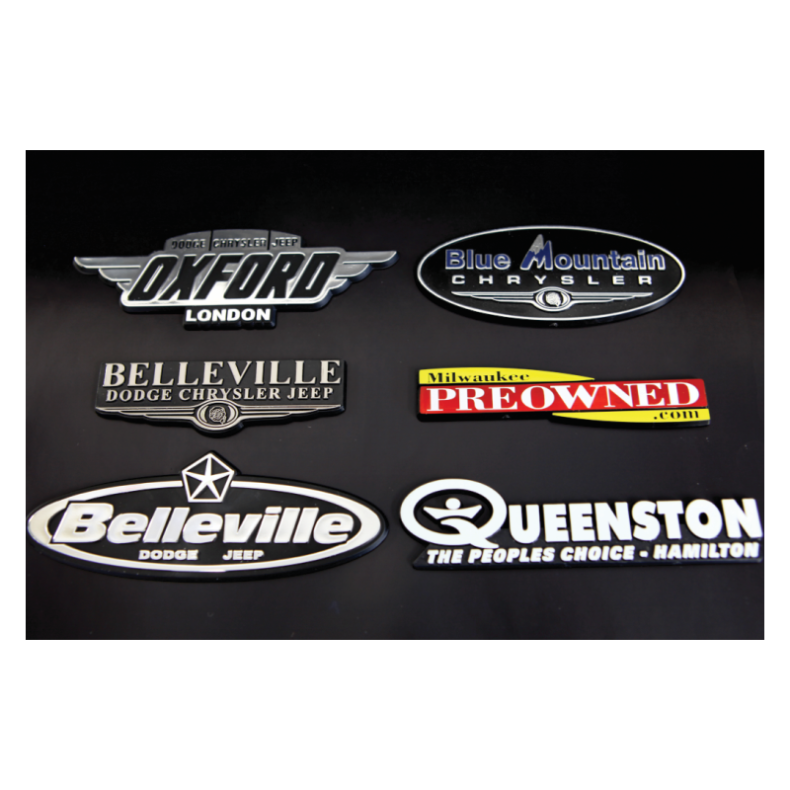How Plastic Nameplates Are Manufactured: A Comprehensive Overview to Their Production Process
The manufacturing of plastic nameplates involves numerous exact steps, starting from the selection of appropriate materials to the last complements. Each phase is crucial, guaranteeing the item satisfies particular demands for toughness and looks. Various manufacturing methods play a considerable role in crafting these nameplates. Understanding these processes can clarify the intricacies behind what may appear like a basic product. What variables add to the high quality and modification of these nameplates?
Comprehending Plastic Materials Made Use Of for Nameplates

The Layout Refine: From Principle to Prototype
The style process for plastic nameplates begins with a clear concept that overviews the overall creation. Designers collaborate with clients to specify the objective, style, and details demands of the nameplate. This first stage includes conceptualizing sessions, mapping out concepts, and selecting shades and fonts that line up with branding goals.Once the principle is established, developers use computer-aided design (CAD) software program to produce in-depth electronic depictions. These models permit for visualization and adjustments before moving on. Comments from stakeholders is indispensable during this stage, as it assists improve the style to meet expectations.After wrapping up the digital prototype, a physical model may be generated, frequently through strategies like 3D printing. This tangible depiction makes it possible for additional analysis of aesthetic appeals and performance. Generally, the layout procedure is a crucial step that lays the foundation for the effective production of premium plastic nameplates.
Cutting and Forming the Plastic
In the cutting and forming stage of plastic nameplate production, the selection of products plays a necessary function in identifying the final product's quality and durability (Plastic Nameplates). Various accuracy reducing techniques, such as laser cutting and CNC machining, guarantee that the plastic is formed with precision and uniformity. This mix of careful product selection and progressed cutting methods is important for creating high-quality nameplates

Product Option Refine
Selecting the appropriate product is necessary for creating top quality plastic nameplates. Different sorts of plastics are available, each offering unique advantages and qualities. Usual options consist of acrylic, polycarbonate, and PVC. Acrylic is favored for its clarity and UV resistance, making it suitable for exterior applications. Polycarbonate, understood for its durability and influence resistance, is suitable for atmospheres that require enhanced protection. PVC is commonly picked for its cost-effectiveness and flexibility in style. The option procedure additionally thinks about elements such as density, surface, and color finish, which can significantly influence the final appearance and capability of the nameplate. Eventually, the chosen material should straighten with the meant use and aesthetic objectives of the plastic nameplate.
Accuracy Trimming Strategies
While selecting the proper product lays the foundation, accuracy cutting strategies play an essential role in forming the plastic nameplates right into their last kinds. Different approaches, including laser cutting, CNC milling, and die cutting, are employed to achieve precision and uniformity. Laser cutting uses concentrated light to create clean sides and complex designs, ideal for complex patterns. CNC milling offers versatility by eliminating excess material with precision, suiting numerous densities and shapes. Pass away reducing, on the other hand, permits mass production of uniform pieces, boosting efficiency. Each strategy is chosen based on the design specifications and the wanted coating, ensuring that the end product meets top quality standards and consumer expectations while maintaining sturdiness and aesthetic charm.
Printing Strategies for Modification
Just how can producers attain dynamic and precise layouts on plastic nameplates? The response hinges on different printing techniques tailored for personalization. Digital printing has gotten popularity due to its capacity to produce complex layouts and high-resolution pictures directly onto plastic surface areas. This technique permits for quick turn-around times and marginal configuration prices, making it perfect for short runs and individualized orders.Screen printing stays another commonly utilized method, especially for larger amounts. It involves creating a pattern and applying layers of ink, causing rich colors and longevity. UV printing, which uses ultraviolet light to heal the ink, is also reliable, offering exceptional bond and resistance to fading.Additionally, pad printing provides convenience for irregularly designed nameplates, enabling in-depth designs on tough surface areas. These printing approaches allow suppliers to fulfill diverse client needs while making certain top quality and durability in their plastic nameplate items.
Surface Area Treatments and Finishing Options

Quality Control Steps in Manufacturing
Guaranteeing the highest standards of quality assurance during the production of plastic nameplates is essential for keeping item integrity and consumer contentment. Suppliers apply strenuous examination procedures at numerous stages of the manufacturing procedure. Originally, basic materials go through extensive screening to validate they fulfill specifications for toughness and shade consistency. During the molding stage, automated systems keep track of parameters such as temperature level and pressure to avoid defects.In addition, visual inspections are carried out to identify any surface imperfections or misalignments. When the nameplates are generated, they are subjected to useful tests, consisting of bond tests for published aspects and cardiovascular test for sturdiness. Quality assurance teams frequently use analytical tasting methods to evaluate sets, making sure that any inconsistencies from standards are without delay dealt with. This detailed technique not only boosts product quality however additionally fosters trust with clients, affirming the producer's dedication to quality in every nameplate created.
Packaging and Distribution of Finished Nameplates
The product packaging and circulation of ended up plastic nameplates are critical actions in ensuring they get to clients in suitable problem. Different product packaging products are selected to protect the nameplates throughout transit, while delivering techniques are carefully picked based on efficiency and cost-effectiveness. Furthermore, effective storage remedies are carried out to maintain top quality until the nameplates are delivered.
Packaging Products Used
When dispersing completed plastic nameplates, picking appropriate packaging products is vital to assure their defense throughout transportation. Typically utilized products include bubble cover, foam cushioning, and cardboard boxes, all created to support the nameplates against influences and shocks. Bubble wrap supplies a versatile obstacle, while foam extra padding warranties that nameplates stay safely in area, lessening the threat of scratches or damage. In addition, sturdy cardboard boxes are made use of to contain the nameplates, using structural assistance and defense from outside components. Labels might be related to suggest managing check that directions or fragile contents, additionally enhancing safety throughout transportation. Generally, utilizing top quality packaging products considerably contributes to the stability and discussion of the ended up plastic nameplates upon arrival at their destination.
Shipping Approaches Used
Efficient circulation of finished plastic nameplates relies upon different delivery methods that ensure timely and protected delivery. Business often make use of messenger solutions, freight shipping, and post offices, depending on the dimension, weight, and location of the plans. For local shipments, messenger solutions supply fast transportation, ensuring nameplates reach consumers promptly. For bigger orders, products delivery is liked, making use view website of vehicles or delivery containers to move bulk quantities successfully. Postal services serve as a cost-efficient alternative for smaller deliveries, specifically for residential distributions. All shipping methods prioritize protective packaging to avoid damage during transportation. Tracking systems are additionally used to monitor shipments, supplying customers with real-time updates and peace of mind relating to the condition of their orders.
Storage Space Solutions Implemented

Often Asked Questions
What Kinds Of Companies Typically Use Plastic Nameplates?
Plastic nameplates are frequently used by different companies, consisting of workplaces, medical facilities, institutions, and factories. These nameplates serve essential features such as recognition, details display screen, and branding, adding to business effectiveness and specialist appearance throughout diverse settings.
For how long Does the Entire Manufacturing Process Take?
The production procedure duration varies based on intricacy and amount, commonly ranging from a few days to numerous weeks. Elements affecting this timeline include design authorization, material accessibility, and production techniques utilized by the business.
Can Plastic Nameplates Be Recycled After Usage?
Plastic nameplates can be recycled, supplied they are made from recyclable products. However, the accessibility of reusing programs and regional guidelines may affect their recyclability. Proper disposal practices are vital to assure efficient recycling.
What Are the Ecological Influences of Plastic Nameplate Manufacturing?
The ecological impacts of plastic nameplate production include carbon discharges, resource deficiency, and air pollution from manufacturing procedures. Plastic Nameplates. In addition, inappropriate disposal adds to plastic waste, negatively affecting ecological communities and wild animals, highlighting the need for lasting methods
Exist Any Kind Of Safety And Security Worry About Plastic Nameplates?
Safety and security problems concerning plastic nameplates primarily include potential chemical direct exposure throughout production and the threat of products degrading over time, which may result in dangerous materials being launched, impacting both human health and wellness and the atmosphere. While various products can be made use of for nameplates, plastic stays a prominent option due to its versatility and sturdiness. In the cutting and shaping stage of plastic nameplate manufacturing, the selection of materials plays an essential duty in establishing the last product's quality and durability. Selecting the best product is crucial for creating high-grade plastic nameplates. While picking the proper product lays the groundwork, accuracy cutting strategies play a necessary duty in shaping the plastic nameplates right into their final forms. When distributing ended up plastic nameplates, choosing appropriate product packaging products is necessary to assure their defense during transportation.